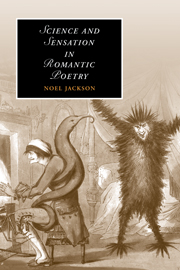Book contents
- Frontmatter
- Contents
- List of illustrations
- Acknowledgments
- List of abbreviations
- Introduction: Lyrical forms and empirical realities: reading Romanticism's “language of the sense”
- PART I SENSES OF HISTORY: BETWEEN THE MIND AND THE WORLD
- PART II SENSES OF COMMUNITY: LYRIC SUBJECTIVITY AND “THE CULTURE OF THE FEELINGS”
- PART III THE PERSISTENCE OF THE AESTHETIC: AFTERLIVES OF ROMANTICISM
- Notes
- Select bibliography
- Index
- CAMBRIDGE STUDIES IN ROMANTICISM
Introduction: Lyrical forms and empirical realities: reading Romanticism's “language of the sense”
Published online by Cambridge University Press: 22 September 2009
- Frontmatter
- Contents
- List of illustrations
- Acknowledgments
- List of abbreviations
- Introduction: Lyrical forms and empirical realities: reading Romanticism's “language of the sense”
- PART I SENSES OF HISTORY: BETWEEN THE MIND AND THE WORLD
- PART II SENSES OF COMMUNITY: LYRIC SUBJECTIVITY AND “THE CULTURE OF THE FEELINGS”
- PART III THE PERSISTENCE OF THE AESTHETIC: AFTERLIVES OF ROMANTICISM
- Notes
- Select bibliography
- Index
- CAMBRIDGE STUDIES IN ROMANTICISM
Summary
This is a book about the literary uses of sensation in the period of British Romanticism. Its subject is a language that emerges in this period for describing forms of sense experience unique to the poet and to the encounter with poetry. Working from a contemporary understanding of aesthetics as a science of aisthesis or sensuous experience, Romantic poets give shape to a literary practice defined in a close relationship to the contemporary sciences of physiology and the science of mind, and develop an aestheticized vocabulary for articulating the social and political ends to which such scientific knowledge was considered crucial. Focusing on a few contexts and nineteenth-century legacies of this vocabulary, the following chapters situate in relation to the human-scientific project of the late eighteenth century the experiential idiom that William Wordsworth calls, in a characteristic double-entendre from the “Lines, written a few miles above Tintern Abbey,” “the language of the sense” (LB, 109).
To summarize the argument, I contend that the vocabulary of embodied aesthetic experience represented for Romantic poets a powerfully charged site for defining and defending the political work of aesthetic culture. Developing a framework for understanding the uniquely social logic of this inward-turning language, this book seeks to show that a considerable degree of historical self-consciousness inhabits the empirical representations of Romantic poetry. Moreover, my study finds in Romantic poems an often strikingly self-conscious ambivalence about the precise political ends that could be served through the medium of aesthetic experience.
- Type
- Chapter
- Information
- Science and Sensation in Romantic Poetry , pp. 1 - 20Publisher: Cambridge University PressPrint publication year: 2008

